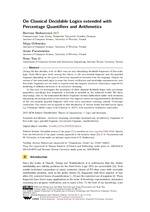On Classical Decidable Logics extended with Percentage Quantifiers and Arithmetics
From International Center for Computational Logic
On Classical Decidable Logics extended with Percentage Quantifiers and Arithmetics
Bartosz BednarczykBartosz Bednarczyk, Maja OrłowskaMaja Orłowska, Anna PacanowskaAnna Pacanowska, Tony TanTony Tan
Bartosz Bednarczyk, Maja Orłowska, Anna Pacanowska, Tony Tan
On Classical Decidable Logics extended with Percentage Quantifiers and Arithmetics
In Mikołaj Bojańczyk, Chandra Chekuri, eds., Proceedings of the 41st IARCS Annual Conference on Foundations of Software Technology and Theoretical Computer Science (FSTTCS 2021), volume 213 of Leibniz International Proceedings in Informatics, 36:1--36:15, December 2021. Schloss Dagstuhl - Leibniz-Zentrum fur Informatik
On Classical Decidable Logics extended with Percentage Quantifiers and Arithmetics
In Mikołaj Bojańczyk, Chandra Chekuri, eds., Proceedings of the 41st IARCS Annual Conference on Foundations of Software Technology and Theoretical Computer Science (FSTTCS 2021), volume 213 of Leibniz International Proceedings in Informatics, 36:1--36:15, December 2021. Schloss Dagstuhl - Leibniz-Zentrum fur Informatik
- KurzfassungAbstract
During the last decades, a lot of effort was put into identifying decidable fragments of first-order logic. Such efforts gave birth, among the others, to the two-variable fragment and the guarded fragment, depending on the type of restriction imposed on formulae from the language. Despite the success of the mentioned logics in areas like formal verification and knowledge representation, such first-order fragments are too weak to express even the simplest statistical constraints, required for modelling of influence networks or in statistical reasoning. In this work we investigate the extensions of these classical decidable logics with percentage quantifiers, specifying how frequently a formula is satisfied in the indented model. We show, surprisingly, that all the mentioned decidable fragments become undecidable under such extension, sharpening the existing results in the literature. Our negative results are supplemented by decidability of the two-variable guarded fragment with even more expressive counting, namely Presburger constraints. Our results can be applied to infer decidability of various modal and description logics, e.g. Presburger Modal Logics with Converse or ALCI, with expressive cardinality constraints. - Weitere Informationen unter:Further Information: Link
- Forschungsgruppe:Research Group: Computational LogicComputational Logic
@inproceedings{BOPT2021,
author = {Bartosz Bednarczyk and Maja Or{\l}owska and Anna Pacanowska and
Tony Tan},
title = {On Classical Decidable Logics extended with Percentage
Quantifiers and Arithmetics},
editor = {Miko{\l}aj Boja{\'{n}}czyk and Chandra Chekuri},
booktitle = {Proceedings of the 41st {IARCS} Annual Conference on Foundations
of Software Technology and Theoretical Computer Science (FSTTCS
2021)},
series = {Leibniz International Proceedings in Informatics},
volume = {213},
publisher = {Schloss Dagstuhl - Leibniz-Zentrum fur Informatik},
year = {2021},
month = {December},
pages = {36:1--36:15},
doi = {10.4230/LIPIcs.FSTTCS.2021.36}
}
